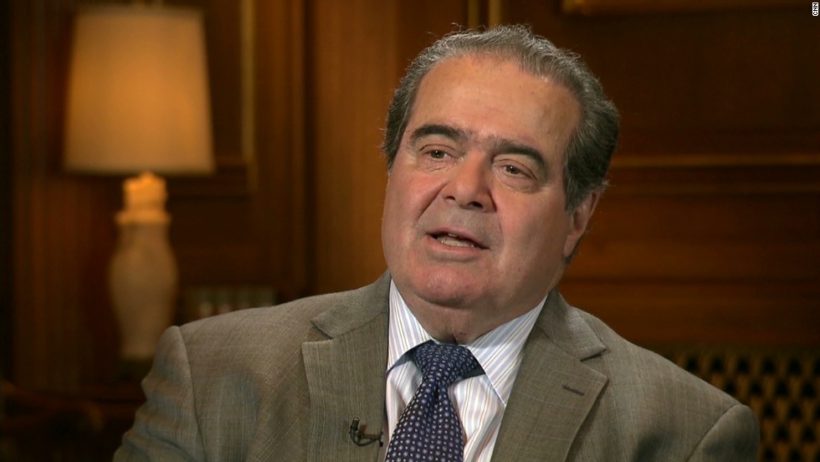The Question Women Want to Hear SCOTUS Nominee Neil Gorsuch Answer

By:
For over a year, the U.S. Supreme Court has been left with a vacant seat, due to Justice Antonin Scalia’s death.

Today, President Donald Trump’s nominee — Judge Neil Gorsuch — began his confirmation hearings before the Senate Judiciary Committee. And beyond highlighting partisan rifts — President Barack Obama's nominee Merrick Garland was blocked by Senate Republicans — Gorsuch is coming under fire for comments he allegedly made in 2016 at the University of Colorado Law School about maternity leave.
People really want to know: What are his views on women's rights? And maternity leave?
A former law student of Gorsuch alleges that the judge believes women take advantage of companies by way of maternity leave.
Via a letter to the Senate Judiciary Committee sent on Friday, Jennifer R. Sisk of Denver, Colorado expressed concern that these alleged feelings may stand in the way of his ruling cases fairly. The letter was posted online by the National Women's Law Center.
Judge Gorsuch allegedly stressed that “companies must ask females about their family and pregnancy plans to protect the company,” during a course that he taught, according to Sisk's letter. Moreover, Sisk wrote, “Judge Gorsuch continued to make it very clear that the question of commitment to work over family was one that only women had to answer to.”
Sisk noted that she was surprised Gorsuch could think this of working women and be up for such a high office. “It concerns me that a man who is being considered for our highest court holds views that discounts the worth of working females,” Sisk wrote at the end of the letter.
Sisk previously worked as a staffer for former Sen. Mark Udall (D-Colo.) and for the Interior Department, and she told NPR that she wrote the letter "so that the proper questions could be asked during his confirmation hearings." Sisk told NPR she also brought up the conversation with deans at the university after it happened, but that her intent was not for him to stop teaching.
A current student at the University of Colorado Will Hauptman, also wrote a letter to the Senate Judiciary Committee disputing the manor of the aforementioned conversation about maternity leave.
"The judge was very matter-of-fact in that we would face difficult decisions; he himself recalled working late nights when he had a young child with whom he wished to share more time," Hauptman wrote. "The seriousness with which the judge asked us to consider these realities reflected his desire to make us aware of them, not any animus against a career or group."
Eleven former law clerks for Judge Gorsuch have also come to his defense, NPR reports.
America’s view of maternity leave.
America does not guarantee paid maternity leave and is the only country besides Papua New Guinea to do so. Just last week India moved to offer twenty six weeks of paid maternity leave to citizens, a length of time that is among the highest in the world.
Moreover, this should be a non-issue: persons of all political views support the idea of family leave in America, and the benefits of leave on a family are overwhelmingly positive. Yet, American policy has yet to take note.
This is not the only one of Gorsuch’s views to cause concern.
Beyond his controversial remarks about maternity leave, critics are worried about how he may rule on matters like the military's use of torture, gun ownership, and LGBT rights.
In 2005, Gorsuch was an official in the Bush administration’s Justice Department, who worked on war on terror practices including matters of torture, according to the New York Times. Sen. Dianne Feinstein (D-Calif.) also wrote a letter requesting additional documents about his tenure in the department, including "any materials related to any involvement you had in the issue of torture (including so-called ‘enhanced interrogation techniques’), including this proposal," referring to a "seminar on torture policy," which was not included in a batch of Justice Department documents given to the committee.
Gorsuch aligns with “originalism,” a legal view that interprets the Constitution in the context of when it was written. This view has caused some Senate Democrats like Sen. Feinstein to be concerned about how that will affect an issue like gun ownership.
Gorsuch could also affect LGBT rights as he opposes the dignity principle — that a person’s dignity should be protected — which is often a driver in minority rights cases, according to the Center for American Progress.
Gorsuch's hearings won't be easy — and they're already problematic.
Democrats are making it a point to clearly define Gorsuch's thoughts on key issues. They have also been very vocal on the blocking of Judge Merrick Garland by Republicans in the Senate during Obama's final year in office. The resulting atmosphere has been tense.
“Republicans on this committee are guilty of their own 'court un-packing scheme,'” Vermont Senator Patrick Leahy said at today's hearing. "The blockade of Chief Judge Merrick Garland was never grounded in principle or precedent."
The Senate Judiciary Committee vote on Gorsuch is expected to be held on April 3.
Update March 21, 2017 3:39 a.m. PDT: This story was updated to include another student's account along with Sisk's previous employment.
